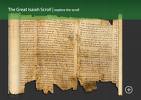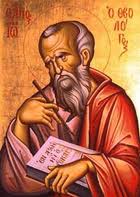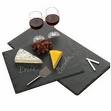
| Next | Previous | Index | Tellout Home |
40. Sweet Little Scroll
Revelation 10.8-11
"Then the voice I had heard from heaven spoke to me once more: 'Go, take the scroll that lies open in the angel's hand standing on the sea and the land.' So I went to the angel and asked him to give me the little scroll. He said to me, 'Take and eat it. It will turn your stomach sour, but in your mouth, it will be as sweet as honey.' I took the little scroll from the angel's hand and ate it. It tasted as sweet as honey in my mouth, but when I had eaten it, my stomach turned sour. Then he told me, 'You must prophesy again about many peoples, nations, languages, and kings.'" (Revelation 10.8-11) ✞
Sweet Little Scroll
 The Greek word for "little scroll" is "Biblaridion" or "little book," from which root the similar term "Biblia" meaning "the books" or "Bible" also comes. "Little book" is an unusual phrase only occurring in Revelation 10.2, "He was holding a little scroll, which lay open in his hand." and Revelation 10.9-10, "so I went to the angel and asked him to give me the little scroll." This little scroll was open for all to read. The prophet Ezekiel speaks of a similar little scroll in Ezekiel 3.1-3, "And God said to me, 'Son of man, eat what is before you, eat this scroll; then go and speak to Israel's people.' So I opened my mouth, and he gave me the scroll to eat. Then he said to me, 'Son of man, eat this scroll I am giving you and fill your stomach with it.' So I ate it, and it tasted as sweet as honey in my mouth." John of Patmos describes the same experience as Ezekiel when he eats the little scroll. Revelation's special scroll contains the final unfolding judgments, initially as sweet as honey comforting prophecies in his mouth. Disturbing clues then appear which taste sour to his stomach." ✞
The Greek word for "little scroll" is "Biblaridion" or "little book," from which root the similar term "Biblia" meaning "the books" or "Bible" also comes. "Little book" is an unusual phrase only occurring in Revelation 10.2, "He was holding a little scroll, which lay open in his hand." and Revelation 10.9-10, "so I went to the angel and asked him to give me the little scroll." This little scroll was open for all to read. The prophet Ezekiel speaks of a similar little scroll in Ezekiel 3.1-3, "And God said to me, 'Son of man, eat what is before you, eat this scroll; then go and speak to Israel's people.' So I opened my mouth, and he gave me the scroll to eat. Then he said to me, 'Son of man, eat this scroll I am giving you and fill your stomach with it.' So I ate it, and it tasted as sweet as honey in my mouth." John of Patmos describes the same experience as Ezekiel when he eats the little scroll. Revelation's special scroll contains the final unfolding judgments, initially as sweet as honey comforting prophecies in his mouth. Disturbing clues then appear which taste sour to his stomach." ✞
Dead Sea Scrolls
 This "little scroll" reminds me of my visit to the "Dead Sea Scrolls" exhibit in "The Shrine of the Book" in Jerusalem. One scroll, the twenty-four feet long "Book of Isaiah," is stretched out in a circular viewing case for all to see. After displaying a scroll for 3–6 months, it is removed from its showcase and placed temporarily in a special storeroom, where it "rests" from exposure to light and people's corrosive breaths! The fragility and sheer quantity of scrolls make it impossible to display them all continuously. The Isaiah scroll dates from the second century BC and proves beyond doubt Isaiah's authenticity and historicity. Shepherds found the Dead Sea Scrolls in the "Qumran Caves" in the Judaean Desert in the West Bank. They were written as early as the 8th century BC and contain a virtually complete set of Old Testament Books almost identical to those we read today. ✞
This "little scroll" reminds me of my visit to the "Dead Sea Scrolls" exhibit in "The Shrine of the Book" in Jerusalem. One scroll, the twenty-four feet long "Book of Isaiah," is stretched out in a circular viewing case for all to see. After displaying a scroll for 3–6 months, it is removed from its showcase and placed temporarily in a special storeroom, where it "rests" from exposure to light and people's corrosive breaths! The fragility and sheer quantity of scrolls make it impossible to display them all continuously. The Isaiah scroll dates from the second century BC and proves beyond doubt Isaiah's authenticity and historicity. Shepherds found the Dead Sea Scrolls in the "Qumran Caves" in the Judaean Desert in the West Bank. They were written as early as the 8th century BC and contain a virtually complete set of Old Testament Books almost identical to those we read today. ✞
Sweet and Sour
 The heavenly voice tells John of Patmos to take a scroll, which would typically have been a papyrus roll, parchment, or animal hide containing writing, and eat it! Believers find God's word is sweet because it brings encouragement. However, it leaves a sour taste on the stomach because of the coming judgments it contains. If we knew the future today, it might seem initially sweet, but it would also hold bitterness for us. God knows our needs better than we know them ourselves, so it is wise not to become obsessed with the future. To John of Patmos, the scroll is both sweet and painful at the same time. ✞
The heavenly voice tells John of Patmos to take a scroll, which would typically have been a papyrus roll, parchment, or animal hide containing writing, and eat it! Believers find God's word is sweet because it brings encouragement. However, it leaves a sour taste on the stomach because of the coming judgments it contains. If we knew the future today, it might seem initially sweet, but it would also hold bitterness for us. God knows our needs better than we know them ourselves, so it is wise not to become obsessed with the future. To John of Patmos, the scroll is both sweet and painful at the same time. ✞
Bitter Sweet
 Interestingly, President Biden said, "This must seem bittersweet" when addressing the police who had served in the capital during the attack on the Congress building. He meant, I think, that though the officers received a gold medal, they had to live with the memory of being attacked. The sweetness is precious for the Christian because it is a great privilege to be chosen as a messenger, but the message itself may be a painful foretelling of some other terrible fate. For John of Patmos, it was a great privilege to be admitted to heaven's secrets, but at the same time, it was challenging to proclaim a time of terror, even if with a triumphant conclusion. ✞
Interestingly, President Biden said, "This must seem bittersweet" when addressing the police who had served in the capital during the attack on the Congress building. He meant, I think, that though the officers received a gold medal, they had to live with the memory of being attacked. The sweetness is precious for the Christian because it is a great privilege to be chosen as a messenger, but the message itself may be a painful foretelling of some other terrible fate. For John of Patmos, it was a great privilege to be admitted to heaven's secrets, but at the same time, it was challenging to proclaim a time of terror, even if with a triumphant conclusion. ✞
Taking the Scroll
 Here, heaven's voice tells John of Patmos to "take the scroll" not once but twice. Even when he asks the angel to give it to him, the angel tells him that he has to take it for himself. The inference is that God never forces his revelation on anyone, but they must take the scroll of life themselves. In both images, the idea is the same. God's messengers have to take God's word into their very beings with both negative and positive consequences. Such is a messenger's responsibility! ✞
Here, heaven's voice tells John of Patmos to "take the scroll" not once but twice. Even when he asks the angel to give it to him, the angel tells him that he has to take it for himself. The inference is that God never forces his revelation on anyone, but they must take the scroll of life themselves. In both images, the idea is the same. God's messengers have to take God's word into their very beings with both negative and positive consequences. Such is a messenger's responsibility! ✞
Sweeter than Honeycomb
 The sweet honey scroll from the angel's hand to the Apostle John's mouth turns bitter. There are at least 26 references to "honey" in the Bible. In Psalm 19.10, the Lord's decrees are "more precious than gold, than much pure gold; they are sweeter than honey from the honeycomb." Later in Psalm 119.103, we read, "How sweet are your words to my taste, sweeter than honey to my mouth!" Proverbs 16.24 adds, "Pleasant words are as a honeycomb, sweet to the soul, and health to the bones." Jonathan loved honey, for we read in 1 Samuel 14.27, "he put out the end of the staff that was in his hand and dipped it in the honeycomb and put his hand to his mouth, and his eyes brightened." ✞
The sweet honey scroll from the angel's hand to the Apostle John's mouth turns bitter. There are at least 26 references to "honey" in the Bible. In Psalm 19.10, the Lord's decrees are "more precious than gold, than much pure gold; they are sweeter than honey from the honeycomb." Later in Psalm 119.103, we read, "How sweet are your words to my taste, sweeter than honey to my mouth!" Proverbs 16.24 adds, "Pleasant words are as a honeycomb, sweet to the soul, and health to the bones." Jonathan loved honey, for we read in 1 Samuel 14.27, "he put out the end of the staff that was in his hand and dipped it in the honeycomb and put his hand to his mouth, and his eyes brightened." ✞
Lick the Slate
 Behind the words "sweet as honey" lies a pleasant Jewish educational custom. A Jewish boy learning his alphabet's characters writes his letters in a mixture of flour and honey on a slate. He needs to know what they are and how they sound. The teacher then points at a letter and asks, "What is this, and how does it sound?" If a boy answers correctly, he can lick the letter's honey off the slate as a reward! When the prophet and the psalmist speak about God's words and judgments being sweeter than a scroll, it may well be that they are thinking of this quaint and unusual Jewish custom. ✞
Behind the words "sweet as honey" lies a pleasant Jewish educational custom. A Jewish boy learning his alphabet's characters writes his letters in a mixture of flour and honey on a slate. He needs to know what they are and how they sound. The teacher then points at a letter and asks, "What is this, and how does it sound?" If a boy answers correctly, he can lick the letter's honey off the slate as a reward! When the prophet and the psalmist speak about God's words and judgments being sweeter than a scroll, it may well be that they are thinking of this quaint and unusual Jewish custom. ✞
"Sweet Little Scroll"
by Ron Meacock © 2021
| ^Top Page | Next | Previous |